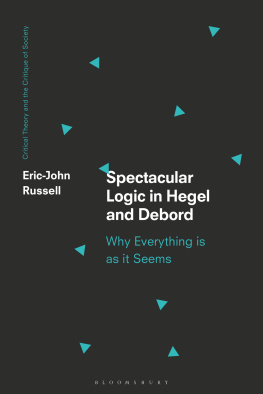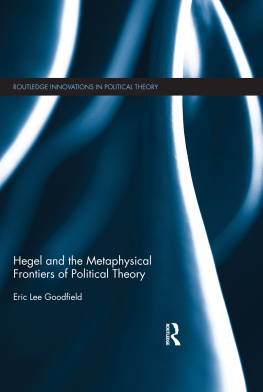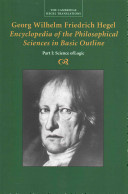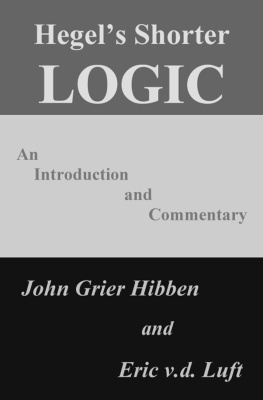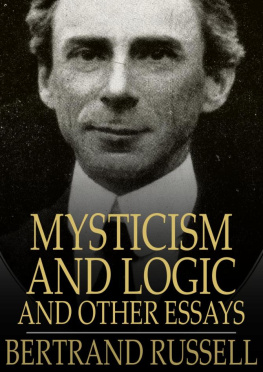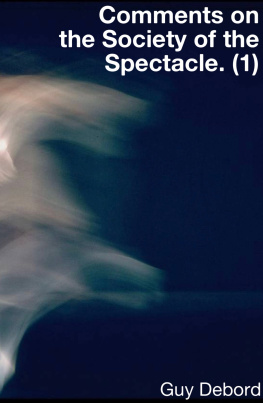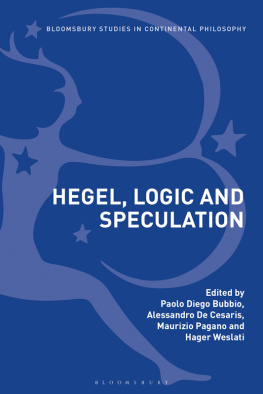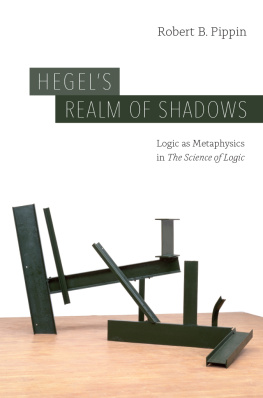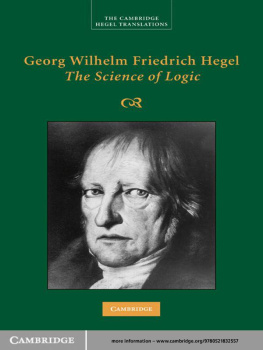Eric-John Russell - Spectacular Logic in Hegel and Debord: Why Everything is as it Seems
Here you can read online Eric-John Russell - Spectacular Logic in Hegel and Debord: Why Everything is as it Seems full text of the book (entire story) in english for free. Download pdf and epub, get meaning, cover and reviews about this ebook. year: 2021, publisher: Bloomsbury, genre: Religion. Description of the work, (preface) as well as reviews are available. Best literature library LitArk.com created for fans of good reading and offers a wide selection of genres:
Romance novel
Science fiction
Adventure
Detective
Science
History
Home and family
Prose
Art
Politics
Computer
Non-fiction
Religion
Business
Children
Humor
Choose a favorite category and find really read worthwhile books. Enjoy immersion in the world of imagination, feel the emotions of the characters or learn something new for yourself, make an fascinating discovery.
- Book:Spectacular Logic in Hegel and Debord: Why Everything is as it Seems
- Author:
- Publisher:Bloomsbury
- Genre:
- Year:2021
- Rating:3 / 5
- Favourites:Add to favourites
- Your mark:
- 60
- 1
- 2
- 3
- 4
- 5
Spectacular Logic in Hegel and Debord: Why Everything is as it Seems: summary, description and annotation
We offer to read an annotation, description, summary or preface (depends on what the author of the book "Spectacular Logic in Hegel and Debord: Why Everything is as it Seems" wrote himself). If you haven't found the necessary information about the book — write in the comments, we will try to find it.
Spectacular Logic in Hegel and Debord: Why Everything is as it Seems — read online for free the complete book (whole text) full work
Below is the text of the book, divided by pages. System saving the place of the last page read, allows you to conveniently read the book "Spectacular Logic in Hegel and Debord: Why Everything is as it Seems" online for free, without having to search again every time where you left off. Put a bookmark, and you can go to the page where you finished reading at any time.
Font size:
Interval:
Bookmark:

Hegel and Debord
Critical Theory and the Critique of Society Series
In a time marked by crises and the rise of right-wing authoritarian populism, Critical Theory and the Critique of Society intends to renew the critical theory of capitalist society exemplified by the Frankfurt School and critical Marxisms critiques of social domination, authoritarianism and social regression by expounding the development of such a notion of critical theory, from its founding thinkers, through its subterranean and parallel strands of development, to its contemporary formulations.
Series editors: Werner Bonefield, University of York, UK and Chris OKane, John Jay College of Criminal Justice, City University of New York, USA
Editorial Board:
Bev Best, Sociology, Concordia University
John Abromeit, History, SUNY, Buffalo State, USA
Samir Gandesha, Humanities, Simon Fraser University
Christian Lotz, Philosophy, Michigan State University
Patrick Murray, Philosophy, Creighton University
Jos Antonio Zamora Zaragoza, Philosophy, Spain
Dirk Braunstein, Institute of Social Research, Frankfurt
Matthias Rothe, German, University of Minnesota
Marina Vishmidt, Cultural Studies, Goldsmiths University
Verena Erlenbusch, Philosophy, University of Memphis
Elena Louisa Lange, Japanese Studies/Philology and Philosophy, University of Zurich
Marcel Stoetzler, Sociology, University of Bangor
Moishe Postone, History, University of Chicago
Matthias Nilges, Literature, St Xavier University
Available titles:
Adorno and Neoliberalism, Charles Andrew Prusik
Right-wing Culture in Contemporary Capitalism, Mathias Nilges
Towards a Critical Theory of Nature, Carl Cassegrd

It is only shallow people who do not judge by appearances.
Oscar Wilde
The Concentrated Spectacle, Internationale situationniste 10 (1966).
The Diffuse Spectacle, Internationale situationniste 10 (1966).
The Independence of the Commodity, Internationale situationniste 10 (1966).
The Domination of the Spectacle over Life, Internationale situationniste 11 (1967).
This book is the revision of a doctoral dissertation. Chapters 3 and 4 are expanded versions of essays published elsewhere: the former appeared as From the Commodity to the Spectacle: Debords Marx, published in the collected volume Capitalism: Concept and Idea 150 Years of Marxs Capital: The Philosophy and Politics of Capital Today, edited Peter Osborne, ric Alliez and Eric-John Russell (2019); the latter appeared as The Eyes of Narcissus: the Province of Reflection in Georg Lukcs and Guy Debord, published in the 2017/2018 Jahrbuch der Internationalen Georg-Lukcs-Gesellschaft, edited by Rdiger Dannemann.
It is with gracious esteem that I acknowledge the support of the Centre for Research in Modern European Philosophy. Particularly valuable have been the encouragement and guidance of its faculty, with noteworthy assistance from Peter Osborne. His support, beyond the fruitful instruction that can be garnered from a supervisor of tact and prowess, gave traction to the reservations of Chateaubriand for whom, it is said, contempt ought to be dispensed sparingly, since there are such a great number of those who deserve it.
I am also indebted to Laurence Le Bras at the Bibliothque nationale de France, Dpartement des manuscrits, whose assistance not only procured several worthwhile discoveries within Guy Debords archival material, but also reignited the fading experience of intimacy still to be had when perusing the posthumously temperamental scribbles of an author.
My gratitude is also extended to Robert Hullot-Kentor whose guidance, knowingly or not, set me on the path of this investigation and taught me that sensibility need not relinquish the instinct to disparage; they in fact make for fine bedfellows.
Further acknowledgement goes to Jade Grogan and Liza Thompson at Bloomsbury, tienne Balibar, Chris OKane, Werner Bonefeld, Howard Caygill, John McHale, Elena Louisa Lange, Frank Engster, Christopher J. Arthur, Tom Bunyard and Anselm Jappe, all of whom, through various discussions over the years, have assisted in bringing this monograph to light.
A debt I owe to few others has the distinction of traversing, all at once, ungodly indulgences, maniacal laughter and an almost insatiable appetite for critique which, as memory serves, cannot be quelled by either promises of popularity or the prevailing criteria of success. For this I name Jonathan Harvey, Zac Dempster, John Clegg and Jacob Blumenfeld, all of whom, through various guises but on the whole, have, in the words of Michle Bernstein, confirmed the correctness of our reproaches and the irredeemability of the people who have not proved capable of remaining with us.
Finally, it is with an exclusive sincerity that I single out Veronika Zhizhchenko, who, besides partaking in the aforementioned exploits, has given me so much more. It would be banal to simply concede that this book would not exist without my wife. Her consultation, gaze and breadth saturate every word. For what she has endured, only multiple lifetimes can restore.
When the original French sources of the writings of Guy Debord and the Situationist International are cited, English translations, when available, were consulted through the following digital archives: www.notbored.org; www.cddc.vt.edu/sionline; and isinenglish.com.
Heretic Hegelianism
tienne Balibar
As an introduction to Eric-John Russells beautiful book on Debord and his Society of the Spectacle, I will offer some spontaneous reactions inspired by my excitement at the idea that his analyses, which I had found quite illuminating when they existed in the form of a philosophical dissertation, are now available for a broad intellectual public in a more polished, incisive and concentrated version.
Guy Debord (193194), a French philosopher who was also an artist, moviemaker, poet and radical activist, remained an outsider with respect to the established intellectual world and the academia, but he played a crucial role in the underground and the birth of a new counter-culture confronting the society of mass consumption He had a wide influence in the fields of art criticism, urban and media sociology and strategic gaming, notwithstanding his continuous prestige in the circles of the ultra-revolutionary left, where he is perceived as the first theorist of what is now called destituent power. In the post-1968 period, he acquired for some a heroic, and for others a quasi-mythical figure. He also provoked many controversies linking his life and actions to his ideas. His name remains mainly attached to a short book, made of 221 aphorisms in Nietzschean or Wittgensteinian fashion, both abstract and eloquent, The Society of the Spectacle (1967), which no history of ideas can neglect. With the passing of the century, however, the question inevitably arises as to which side of the great divide imposed by time he would fall, a divide separating the many works with a mere antiquarian interest from the few whose importance for our life and thought has increased. Despite the evidence that he keeps being commented upon emotionally, or strategically invoked, but also pointedly refuted by major contemporary thinkers (think of Agamben and Rancire respectively), this is a question that cannot be brushed away without a closer examination, especially because our image of his political activism and theoretical practice evokes paradigms widely supposed to belong to the culture of the twentieth century rather than the twenty-first: break-away avant-gardism and a Hegelian Marxist philosophy of history (a paradoxical combination in many respects).
Next pageFont size:
Interval:
Bookmark:
Similar books «Spectacular Logic in Hegel and Debord: Why Everything is as it Seems»
Look at similar books to Spectacular Logic in Hegel and Debord: Why Everything is as it Seems. We have selected literature similar in name and meaning in the hope of providing readers with more options to find new, interesting, not yet read works.
Discussion, reviews of the book Spectacular Logic in Hegel and Debord: Why Everything is as it Seems and just readers' own opinions. Leave your comments, write what you think about the work, its meaning or the main characters. Specify what exactly you liked and what you didn't like, and why you think so.

